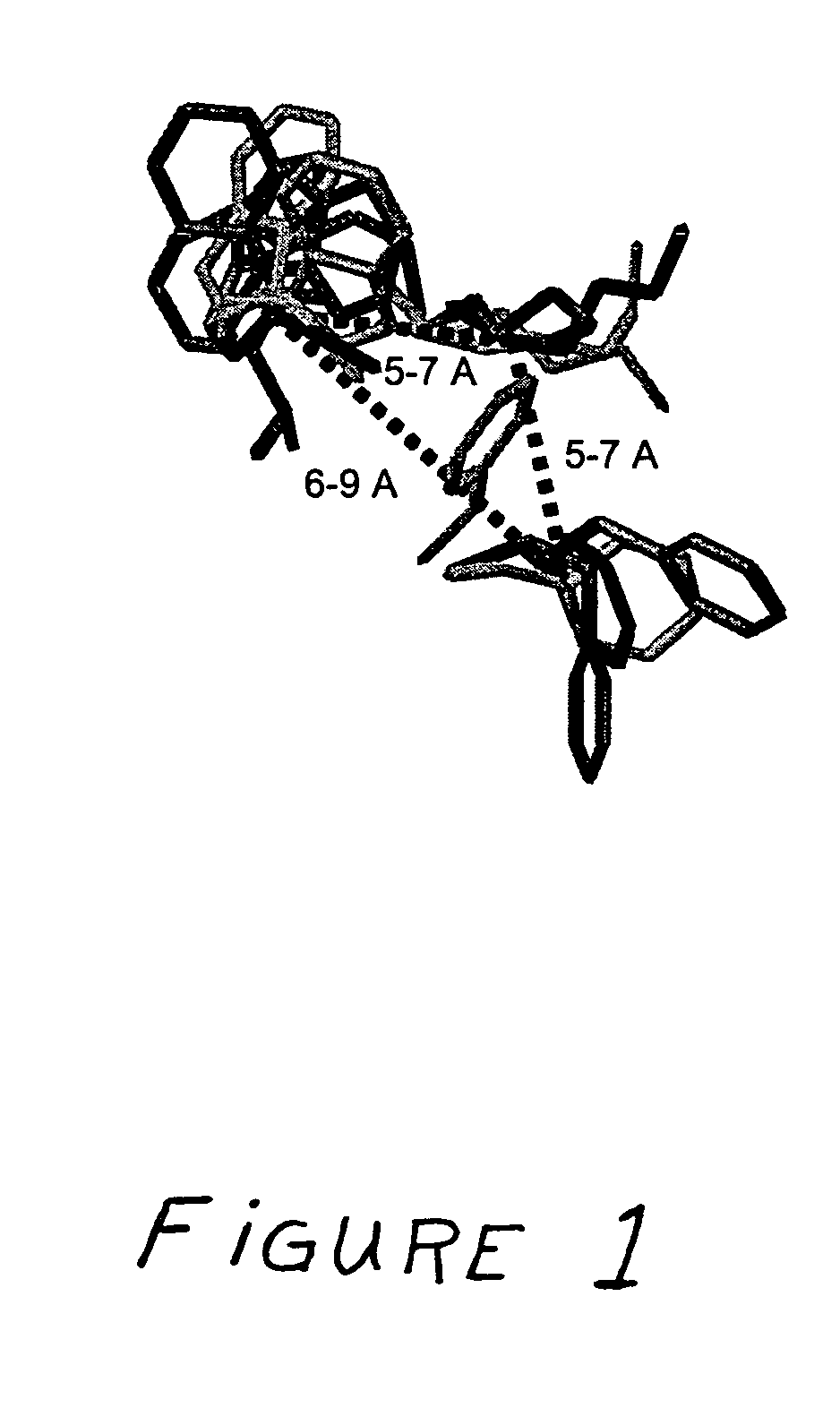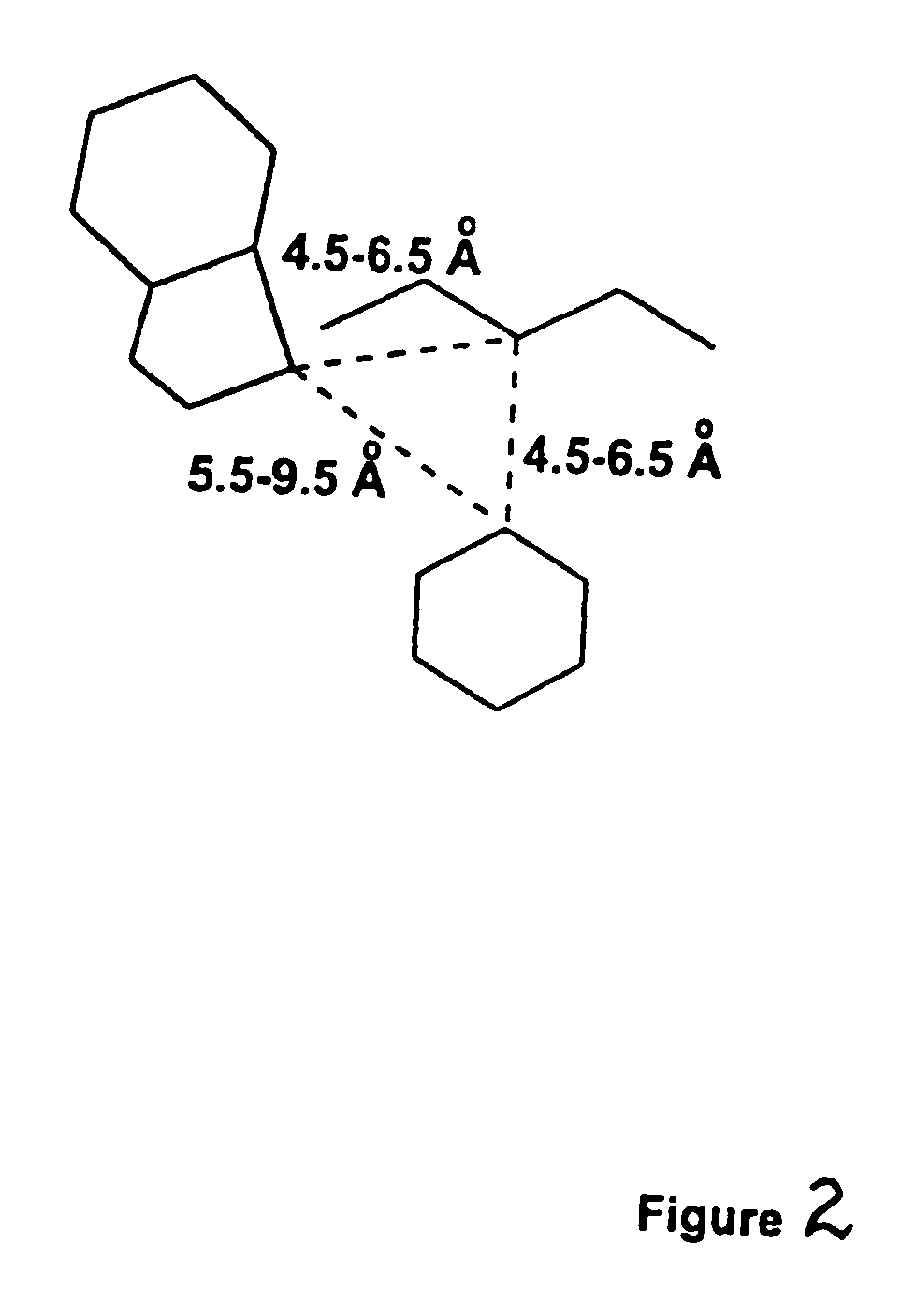Receptor(SSTR4)-selective somatostatin analogs
a somatostatin analog and receptor technology, applied in the field of receptor (sstr4)selective somatostatin analogs, can solve the problems of hampered design efforts, inability to determine the precise localization of sstr4 in the body, and inability to selectively bind to sstr4 and exhibit relatively high affinity
- Summary
- Abstract
- Description
- Claims
- Application Information
AI Technical Summary
Problems solved by technology
Method used
Image
Examples
example 1
[0047]The somatostatin analog des-AA1,2,4,5,12,13[4Aph7]-SRIF having the structure: (cyclo)H-Cys-Phe-4Aph-Trp-Lys-Thr-Phe-Cys-OH (SEQ ID NO:3) is synthesized by the solid phase methodology in a stepwise manner on a chloromethylated resin generally as described in Example 2 of the '499 patent. For the 7-position residue, NαBoc-4-Aph(Fmoc) is coupled into the chain. This synthesis creates the intermediate: Boc-Cys(Mob)-Phe-4Aph(Fmoc)-Trp-Lys(Cl-Z)-Thr(Bzl)-Phe-Cys(Mob)-O—CH2-resin support.
[0048]After removal of the Fmoc group with 20% piperidine in NMP, cleavage of the peptide from the resin and deprotection of the remaining side chain protecting groups are performed in hydrofluoric acid (HF) (25 ml) in the presence of 10% anisole and 5% methylsulfide for 1 hour at 0° C. After elimination of hydrofluoric acid under high vacuum, the resin-peptide is washed with anhydrous diethyl ether.
[0049]The resin is immediately extracted with 75% acetic acid (200 ml). The extract is filtered into a...
example 2
[0052]The initial synthesis described in Example 1 is repeated with one change; NαBoc-D-Trp is used to provide the 8-position residue.
[0053]Cleavage, deprotection, cyclization and purification are then carried out as in Example 1. The purified cyclic octapeptide has the formula: (cyclo)H-Cys-Phe-4Aph-D-Trp-Lys-Thr-Phe-Cys-OH, has a purity on CZE of about 98%, and is referred to as Peptide No. 2. MS analysis shows an [M+H]+ mass of 1094.3 Da, which compares favorably with the calculated value of 1093.45 Da.
example 3
[0054]The synthesis described in Example 1 is repeated with one change. Following removal of the Boc group at the N-terminus, a reaction is carried out to add a carbamoyl (Cbm) moiety and thus create an urea group at the N-terminus.
[0055]After deblocking the α-amino group at the N-terminus using trifluoroacetic acid (TFA), a reaction is carried out with about 1 gm of the peptidoresin and 100 mg of sodium cyanate (NaOCN) and acetic acid (3 ml) for 30 minutes at 22° C. in NMP (4 ml). This reaction results in the addition of the carbamoyl moiety at the N-terminus. Thereafter, cleavage of the peptide from the resin and deprotection of the side chain protecting groups, followed by cyclization and purification, are carried out as in Example 1. The purified cyclic octapeptide has the formula: (cyclo)Cbm-Cys-Phe-4Aph-Trp-Lys-Thr-Phe-Cys-OH (SEQ ID NO:3), has a purity on CZE of about 92% and is referred to as Peptide No. 3. MS analysis shows an [M+H]+ mass of 1137.4 Da, which compares favora...
PUM
| Property | Measurement | Unit |
|---|---|---|
| weight percent | aaaaa | aaaaa |
| volume | aaaaa | aaaaa |
| flow rate | aaaaa | aaaaa |
Abstract
Description
Claims
Application Information
 Login to View More
Login to View More - R&D
- Intellectual Property
- Life Sciences
- Materials
- Tech Scout
- Unparalleled Data Quality
- Higher Quality Content
- 60% Fewer Hallucinations
Browse by: Latest US Patents, China's latest patents, Technical Efficacy Thesaurus, Application Domain, Technology Topic, Popular Technical Reports.
© 2025 PatSnap. All rights reserved.Legal|Privacy policy|Modern Slavery Act Transparency Statement|Sitemap|About US| Contact US: help@patsnap.com


